Decoding the alt-right: How fringe white nationalism invaded the mainstream
A term coined by Richard B Spencer has taken over US political discourse after the election of Donald Trump.
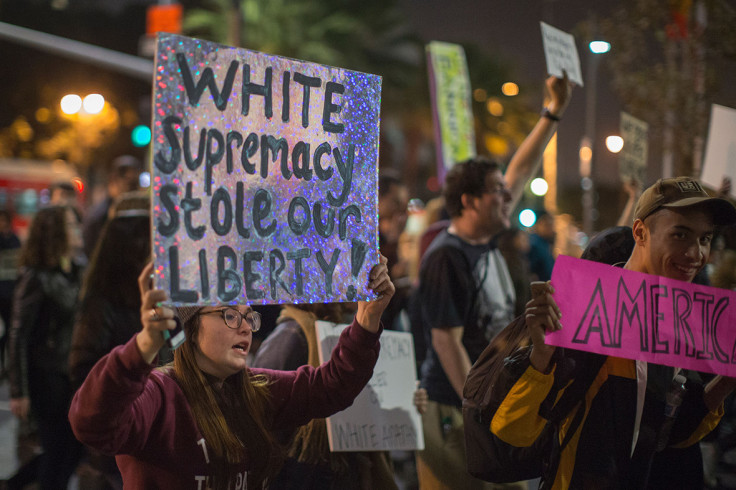
Until a year ago, David Duke was like the the Ku Klux Klan he once headed, a relic of another era; a darker, uglier America of burning crosses, white hoods, racism and violence.
Just like his sieg-heiling acolytes in the so-called "alt-right", Duke and his white nationalist comrades were a nasty fringe of right wing politics defined by anti-Semitism and racism.
However, the election of Donald Trump has brought the alt-right movement to the fore. Duke and other white nationalists such as Jared Taylor, the founder of white supremacist publication American Renaissance, and Richard B Spencer, who coined the alt-right term, have suddenly started appearing in mainstream media outlets.
A search on Google News brings up some 588,000 articles on Duke and 131,000 on Spencer. This clamour for information has seen web searches for the alt-right rocketing since September.
IBTimes UK research shows that the alt-right page on Wikipedia has reached 1.5 million page views at the time of writing, with a daily average of 78,000 unique visitors. The page has been edited more than 100 times in the last 20 days.
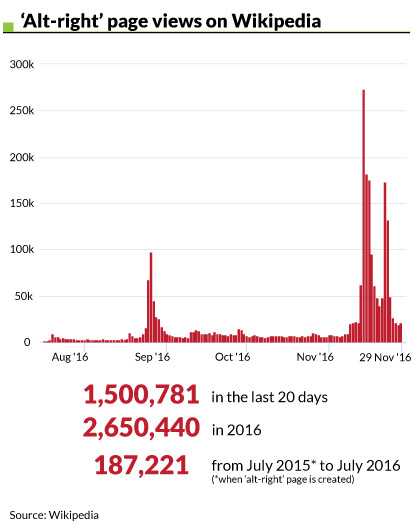
The rise in usage of the term was so pronounced that alt-right became contender for the Oxford Dictionary's international word of the year. It was beaten by the term 'post-truth', another Trump-linked word that reflects the dominance of opinions, emotions and 'fake news' over objective facts.
Newswire The Associated Press (AP), a global guardian of editorial style, has also entered the fray with their own definition and guidelines for journalists covering the alt-right. It describes the movement as "a mix of racism, white nationalism and populism."
AP said that the alt-right "criticises multiculturalism and more rights for non-whites, women, Jews, Muslims, gays, immigrants and other minorities. Its members reject the American democratic ideal that all should have equality under the law regardless of creed, gender, ethnic origin or race."
AP argued that the term alt-right should always be used inside quotation marks and should be followed by the explanation that it was a white nationalist movement. "We should not limit ourselves to letting such groups define themselves, and instead should report their actions, associations, history and positions to reveal their actual beliefs and philosophy."
The rise of the alt-right
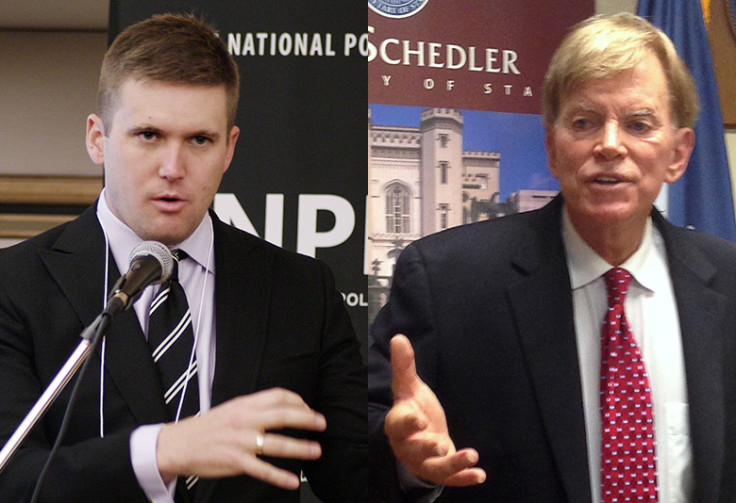
The rise of the alt-right has led to a great deal of soul-searching from commentators and reporters in recent weeks, with some arguing that the blanket coverage of the movement in the run up to and after the election of Donald Trump has turned what was a fringe movement into a mainstream talking point. This is particularly true for Spencer and the think tank he heads up, the National Policy Institute (NPI).
It is important to expose these groups for what they are.
"In many ways Spencer is a younger version of Taylor: well-educated, in tune with modern technology, and determined to bridge the gap between conservatives and 'racial realists' (i.e. closet white supremacists)," said Cas Mudde, associate professor in the School of Public and International Affairs at the University Georgia, writing for the Huffington Post in August 2016.
"Both Spencer and the term alt-right were [...] unknown to the US public until the rise of Donald Trump. And it is actually not so much Trump but the mainstream media that has made them into recognisable names. This has rejuvenated these moribund organisations and undoubtedly strengthened their appeal and support, at least [on] social media," said Mudde.
But it was Hillary Clinton that first brought the term alt-right into the mainstream. On 24 August she mentioned the movement in a campaign speech in Reno, Nevada. Following her comments, white nationalist groups took to social media to thank the Democratic candidate. The first spike in searches for alt-right directly followed her speech, IBTimesUK research shows.
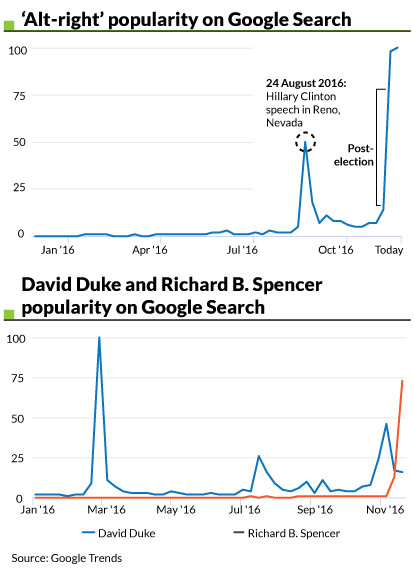
This was disputed by Richard Cohen, the president of the Southern Poverty Law Center, in a comment to the New York Times: "I think every public official ought to denounce racism, and that is what Secretary Clinton did. [Alt-right] is a fancy, almost antiseptic term for white supremacy in the digital world."
Anti alt-right
Indeed, just because internet users are searching for the term, does not mean that they support the movement. IBTimes UK and ImpactSocial research reveals that opposition to the alt-right on social media platforms is stronger than support.
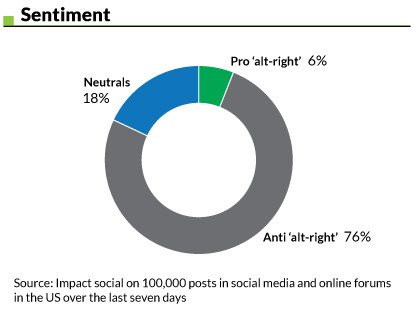
Melissa Deckman, professor of political science at Washington College, told IBTimes UK that while the traditional conservative 'Tea Party' right in the US, many of which voted for Trump, has strident views on immigration and feels "racial resentment", that does not mean they support the alt-right.
"[They] are conservative on [immigration]. They are uncomfortable when English isn't being spoken. But does that mean that they're [...] white nationalists? No. I think there's a difference," she said.
"[Trump support is] a disgust with the political status quo but I don't think that the alt-right is about that, I think that the alt right is just racist."
As for the blanket coverage of the movement by the media since Trump's election, Deckman thinks it is healthy: "I think it is important to expose these groups for what they are. In this day and age you can't brush it under the carpet. I think it is better that we have these open conversations about it. That we call a spade a spade and we denounce them."
Donald Trump has spoken out against the white nationalist movement since his election, saying that he 'disavowed' them after footage of an event at which supporters of Spencer gave Nazi salutes. But he gave a robust defence of Steve Bannon, founder of alt-right news website Breitbart, who he appointed as his chief strategist.
"I've known Steve Bannon a long time. If I thought he was a racist or alt-right or any of the things, the terms we could use, I wouldn't even think about hiring him," Trump said.
But plenty in the US would like to see Trump go further, distancing himself from both the movement and figures linked to it, but also to those that have stoked the flames, like Breitbart and its former chief. Bannon. Until he does, America's curiosity about the movement will likely continue, and Trump's association with it could lose him support on both sides of the political divide.
© Copyright IBTimes 2025. All rights reserved.






















